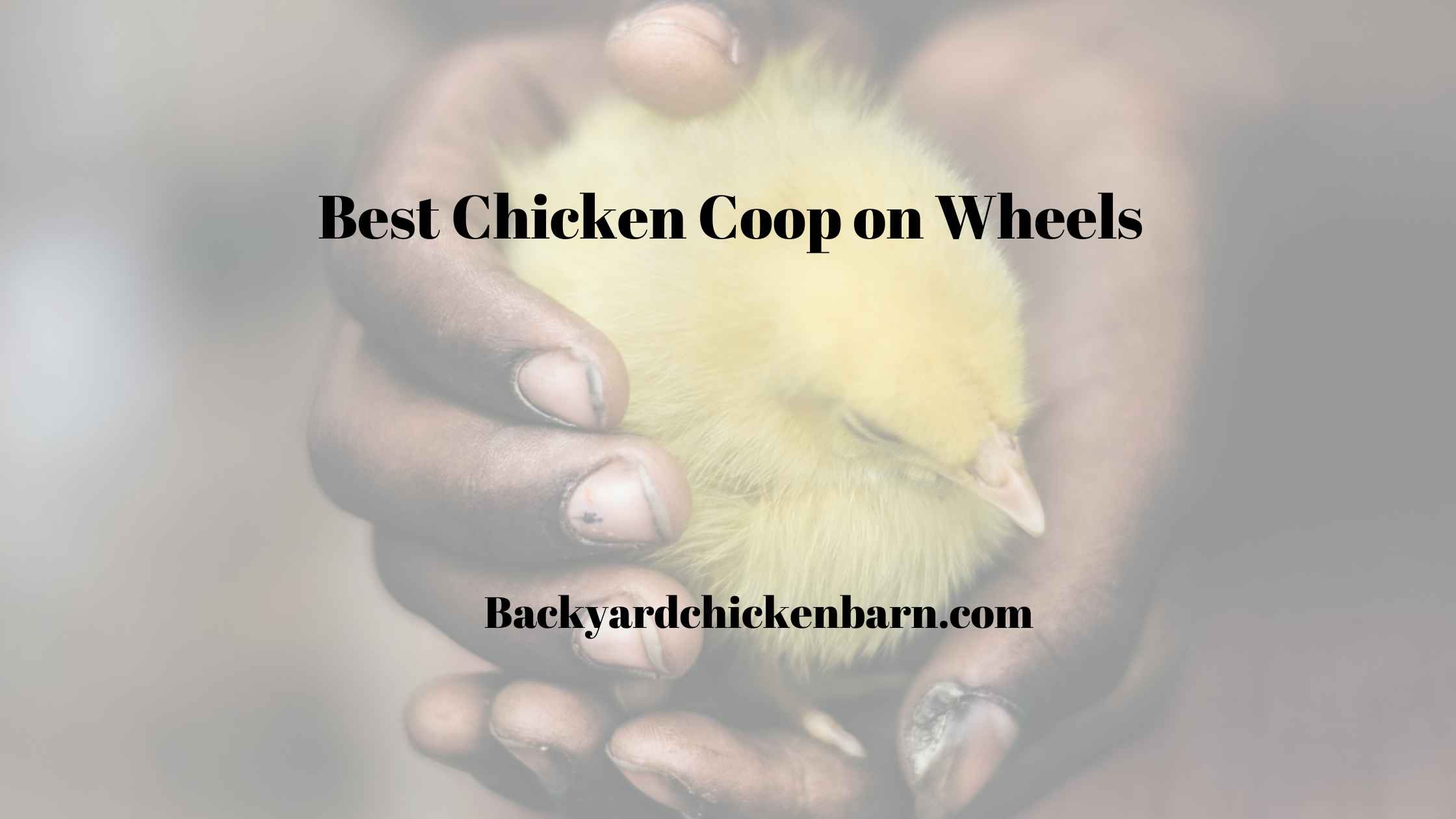The 7 Best Chicken Coop on Wheels
Raising chickens in your backyard provides a range of benefits, from fresh eggs to natural pest control.
As urban farming becomes more popular, people are constantly looking for flexible and efficient ways to care for their flock.
One such innovation is the mobile chicken coop, often referred to as a ‘chicken tractor’.
SHOP CHICKEN COOP ON WHEELS ON AMAZON
Let’s delve into the advantages of a chicken coop on wheels and how to choose the best one for your needs.
Advantages of a Chicken Coop on Wheels:
- Rotation of Free Range Areas: Moving your coop regularly allows your chickens to have consistent access to fresh grass, insects, and worms, improving their diet and the quality of their eggs.
- Pest and Weed Control: As the coop moves, chickens get to scratch and peck at new ground, helping to control pests and weeds in different areas of your yard.
- Natural Fertilization: Shifting the coop means the chickens’ manure is distributed across a larger area, acting as a natural fertilizer.
- Safety: A mobile coop can be moved to safer locations if there’s a threat from predators or severe weather.
- Hygiene: Regularly moving your chickens reduces their exposure to accumulated waste, decreasing the chances of disease.
Factors to Consider When Choosing the Best Chicken Coop on Wheels:
- Size and Capacity: Consider the number of chickens you plan to keep. A general rule is to allow 2-3 square feet per chicken inside the coop and about 10 square feet per bird in an outside run.
- Material: Opt for durable, weather-resistant materials. Untreated wood is a popular choice, but ensure that it’s sturdy and free from harmful chemicals.
- Wheel Quality: Look for robust, large wheels that can handle the weight of the coop and move smoothly over various terrains.
- Security: Ensure the coop has predator-proof latches, secure netting, and a solid frame.
- Ventilation: Proper ventilation is crucial for the health of your flock, especially during the hotter months.
- Ease of Access: For cleaning, egg collection, and chicken care, ensure the coop design provides easy access.
- Roosting and Nesting Spaces: Chickens need a comfortable place to sleep at night (roost) and a private, cozy spot for laying eggs (nest boxes).
Popular Mobile Chicken Coop Designs:
- A-Frame Chicken Tractor: This is a triangular-shaped coop, lightweight and easy to move, ideal for smaller flocks.
- Rectangle Design: A more traditional shape, offering more space for larger flocks. It often comes with a built-in run beneath the coop.
- Dome or Hoop House Design: Made with flexible materials like PVC, this design is particularly lightweight and easy to move.
In Conclusion:
A chicken coop on wheels can be an excellent solution for those who wish to combine the benefits of free-ranging with the safety and convenience of a coop.
The flexibility of moving your chickens around ensures they get fresh terrain to forage on, while also benefiting your yard. Remember, the best mobile chicken coop is the one that suits your specific needs, whether it’s size, design, or material.
As always, the health and safety of your chickens should be the top priority.
ALSO SEE: Can You Give La-200 Orally to Chickens?

FAQs on Chicken Coops on Wheels
- What is a chicken coop on wheels?
A chicken coop on wheels, often referred to as a ‘chicken tractor’, is a mobile coop that allows poultry keepers to move their birds around their property. - Why would I need a mobile chicken coop?
It offers numerous benefits, including fresh foraging grounds for chickens, natural yard fertilization, and improved hygiene due to less accumulated waste. - How many chickens can I keep in a mobile coop?
It depends on the coop’s size, but generally, 2-3 square feet per chicken inside the coop and about 10 square feet in an outside run is recommended. - Are they safe from predators?
Yes, if designed properly with predator-proof latches and secure netting. - How often should I move the coop?
For optimal benefits, you should move it every 1-3 days. - Can I use a mobile coop in the winter?
Yes, but ensure it offers adequate protection from cold winds and snow. - Is it hard to move the coop?
Not if it’s designed well. Quality wheels and lightweight materials make it easier. - Can I DIY a chicken coop on wheels?
Absolutely! There are many online tutorials and designs available. - How do I clean a mobile chicken coop?
Similar to stationary coops – remove old bedding, clean with a mild disinfectant, and replace with fresh bedding. - What are the common materials used?
Untreated wood, metal mesh or chicken wire, and sometimes PVC for certain designs. - Do mobile coops have nesting boxes?
Yes, most designs include nesting boxes for egg-laying. - How do I ensure proper ventilation?
Look for designs that include vents, windows, or mesh areas. - Do chickens prefer mobile coops?
Chickens enjoy fresh forage, so they often appreciate the changing environment. - How expensive are chicken coops on wheels?
Prices vary based on size and material, but DIY options can be cost-effective. - Are they suitable for urban settings?
Yes, especially if yard space is limited. It allows for effective use of available space. - Can I add an automatic door to a mobile coop?
Yes, many poultry keepers customize their coops with automatic doors for added convenience. - Do these coops come with roosting bars?
Most designs incorporate roosting bars for chickens to sleep on. - Can I keep other poultry in mobile coops?
Yes, they can be used for ducks, quails, or other small poultry, but ensure the design meets the specific needs of the bird. - How do I protect my coop from strong winds?
Anchor it down or move it to a sheltered location during windy conditions. - Can I attach a run to a mobile coop?
Many designs come with attached runs, or you can add one if needed. - What’s the lifespan of a chicken tractor?
With proper care and maintenance, they can last several years. - Do I need a permit for a mobile chicken coop?
Check local regulations, but typically, mobile coops don’t require permits. - How do I prevent the wheels from getting stuck?
Regular maintenance and using larger, sturdy wheels can help. - Is it possible to expand a mobile coop?
Some designs allow for expansions, but it’s easier to ensure you choose the right size from the start. - Can I paint my mobile chicken coop?
Yes, but use non-toxic paint safe for animals. - How do I ensure the coop doesn’t tip over?
Ensure even weight distribution and avoid placing it on steep inclines. - Can chicks be raised in a mobile coop?
Yes, but ensure they’re protected from potential threats and the elements. - Do mobile coops protect against rodents?
A well-designed coop with fine mesh can help keep rodents out. - How heavy is a typical mobile coop?
Weight varies based on size and materials, but many are designed for easy movement. - Are there any downsides to mobile coops?
Some might find moving them regularly cumbersome, and they might not offer as much insulation as stationary coops. - Where can I buy a chicken coop on wheels?
Many online retailers, local farm stores, or through specialized craftspeople. - Can I attach a water system to my mobile coop?
Yes, many poultry keepers add automatic waterers to their coops. - Is it challenging to assemble a purchased mobile coop?
Most come with instructions and are straightforward to assemble. - How do chickens adapt to a moving environment?
Chickens are quite adaptable and often enjoy the variety of a changing landscape. - Do the wheels lock in place?
Most quality designs offer locking wheels to keep the coop stationary when needed. - How do I choose the best location for the coop?
Opt for flat ground with access to fresh grass and shade. - Do mobile coops require more maintenance?
Not necessarily, but regular checks are essential to ensure wheels and moving parts function correctly. - Can I keep a rooster in a mobile coop?
Yes, but consider space needs and potential noise issues. - Do mobile coops get hot in the summer?
Proper ventilation is crucial. Consider placing them in shaded areas during extreme heat. - Are there any books or resources on mobile chicken coops?
Numerous books and online forums discuss poultry keeping with a focus on mobile solutions.


